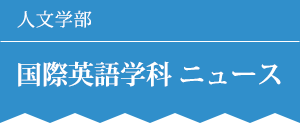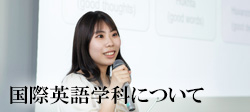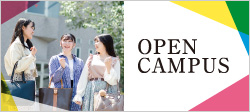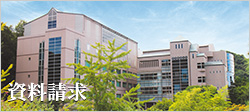I really look forward to any chance to stay in touch with any students who have graduated. For this reason, I greatly enjoy interviewing students who have graduated about their time at university, and their new, working lives. This time, I speak with MS, who graduated in 2019, and so is now quite experienced at being in full-time work. As you'll see, she has been facing a lot of challenges with a positive spirit.
(卒業生を紹介するこのウェブ・ニュースの企画で、卒業生に話を聞くことは教員としてもとても楽しみなことです。今回は、2019年に卒業したM.S.さんに社会人としての経験も積みながらさらに前向きにチャレンジを続ける姿勢について話してもらいました。)
First, I asked MS about what she is doing now.
I got a job at the Japanese Red Cross Society and am currently working in public relations at the Japanese Red Cross Hiroshima College of Nursing. I don't usually work in English in my current role, but I continue to study English with the goal of helping overseas.
(私は日本赤十字社に就職し、現在は日本赤十字広島看護大学で広報の仕事をしています。普段は英語を使った仕事はしていませんが、海外救援を目標に英語の勉強を続けています。)
Next, I asked MS to give some advice to current students, or students who are thinking about joining GSE or other HJU courses.
(次は、在学生とGSEコースに興味を持っている高校生の皆さんへのアドバイスです。)
As a student, you should try as many different things as possible, and challenge yourself. Don't be afraid of what you are interested in, find out your passions, and try them! Please go out of the university and experience various things in real-world environments, not just inside the university. For example, try taking classes at other universities with credit transfer, participating in overseas training, participating in circles and volunteers, going to museums, and other such things. I used to interact with international students from other universities, and actively participate in overseas training and volunteering in developing countries such as Vietnam, Taiwan, the Philippines, and Cambodia.
(学生時代に様々なことにチャレンジしてください。気になること、興味を持ったこと、怖がらずまずはやってみてください。大学内だけにとどまらず、学外に出て様々な環境で色んなことを経験してください。例えば、単位互換で他大学の授業を受けてみたり、海外研修に参加してみたり、サークルやボランティアに参加してみたり、美術館に行ってみたり...。私は他大学の留学生と交流したり、ベトナム・台湾・フィリピン・カンボジアなど、海外研修や途上国のボランティアに積極的に行くようにしていました。)
In the second year, I was taking classes with students from other universities with credit transfer to HJU. I remember getting a lot of inspiration, expanding my circle of friends, and having a lot of fun, and I'm still in touch with many of those people now. It is thought to be difficult to obtain a teacher's license while also doing the GSE course, but I also went to practical training and was able to obtain a middle and high school teacher's license. When taking part in an environmental conservation project, I was in charge of public relations, discussing the contents of the project with people from a TV station, providing explanation. In addition, I was often able to attend museums in the area for free, and so was able to appreciate famous exhibits from all over the world. Looking back, I realise that they were very valuable opportunities.
(2年生には単位互換で他大学の学生と授業を受けていました。刺激をたくさんもらい、友達の輪も広がりとても楽しかったのを覚えていますし、社会人になった今でも連絡を取り合っています。GSEにいながら教員免許を取得するのは難しいと言われていましたが、教育実習にも行き中・高の教員免許も取ることができました。環境保全のプロジェクトでは、渉外担当として共催のテレビ局の担当の方とプロジェクトの内容を話し合ったったり説明に行ったりしていました。また、女学院生は広島県の美術館の入館料が無料だったこともあり、休日はよく美術館へ行っていました。世界中の有名な作品を鑑賞でき、今思えばとても貴重な時間を過ごしていたなと思います。)
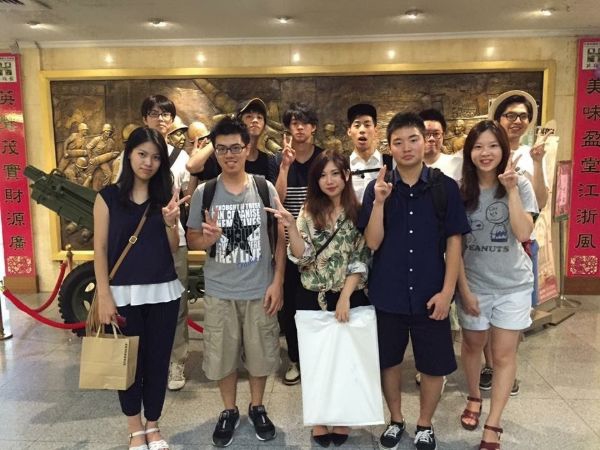
MS says she uses English to communicate with people from all around the world, such as these new friends from her time in Taiwan.
Currently, as a public relations officer, I am in charge of creating pamphlets, posters, train advertisements, managing websites, and holding events. I think that something I experienced at university can be useful and connected to something I never thought of as a member of society. Even if what you are studying and doing may not seem connected to your future, it may be your food for the future. Don't hesitate to be interested in college life, to have fun, and challenge yourself.
(現在は広報担当としてパンフレットやポスター、電車広告などの作成、ホームページの管理やイベント開催などの仕事を任されています。大学で経験した何かが、社会人になって思ってもみなかったところで役立つこと、繋がることがあると思います。直接繋がっていなくても、将来の自分の糧になることもあるかもしれません。大学生の間で興味を持ったことは躊躇せず、楽しんで挑戦してみてください。)
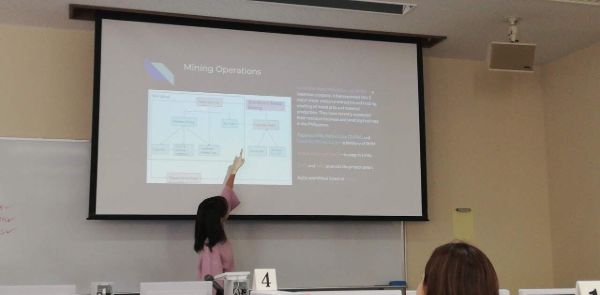
MS spent long hours reading and writing in English for her thesis, meaning her English improved a lot. Here she is giving one of the best GSE thesis presentations in the course's history.
(M.S.さんは大学の卒業研究のため、英語でたくさんの資料を読み、そして論文を完成させました。そのおかげで英語力が飛躍的に向上しました。M.S.さんの卒業論文発表は、それまで卒業生の発表の中でも最も優れた発表の一つです。)
Wow, some really interesting and wise advice from MS. Since MS was a GSE student, I asked her if she had any tips for students considering joining GSE.
(GSEコースに興味を持っている高校生に向けてアドバイスをもらいました。)
I was not good at English when I entered university. When I joined in the first year, many of my friends around me, such as those who have lived abroad, and those who have studied abroad in high school, were good at English, and at first I was overwhelmed by how good they were and their skills. I lost confidence due to my own English abilities. Also, the speaking speed of the native teacher in the university class was much faster than that of the ALT teacher when I was in high school, and I couldn't understand what the teacher was saying, so I could barely keep up at first. However, because GSE is a small group, it is easy to ask when someone doesn't understand during class, and even after class, they taught me kindly until I could understand what was happening.
(私自身、入学時は英語は得意ではありませんでした。大学1年生の頃は、海外に住んでいたことのある人、高校時代に留学経験がある人など、周りの友達はみんな英語が得意で、初めは周りの凄さに圧倒され、自分の英語力の無さに自信を失っていました。また、大学の授業でネイティヴの先生の話す速さは、高校生の時のALTの先生とは比べ物にならないくらい速く、先生が言っていることもなかなか理解できず、ついていくのもやっとでした。しかし、GSEは少人数制ということもあり、授業中でも分からないことは先生に聞きやすく、授業後でも質問したことは理解できるまで親身になって教えてくださいました。)
In addition, the content of the lessons was practical with many discussions and presentations, and I gradually became better able to speak. Of course, there were many challenges, and I often greeted the morning without sleeping, but I think that was the reason why I developed the power of reading and writing. It is necessary to make much effort after enrolling, but you will definitely gain strength, and above all, the teachers will definitely support you. It is hard work, but there is a supportive environment, so don't worry.
(また、授業内容もディスカッションやプレゼンテーションなどが多く実践的な内容で、徐々に話せるようになりました。もちろん課題は多く、寝ずに朝を迎えることも多々ありましたが、それがあったからこそリーディングやライティングの力もついたと思います。入学してからの努力は必要ですが、力は必ずつきますし、先生方がサポートしてくださるなど環境は整っているので、心配せずGSEにチャレンジしてみてください。)
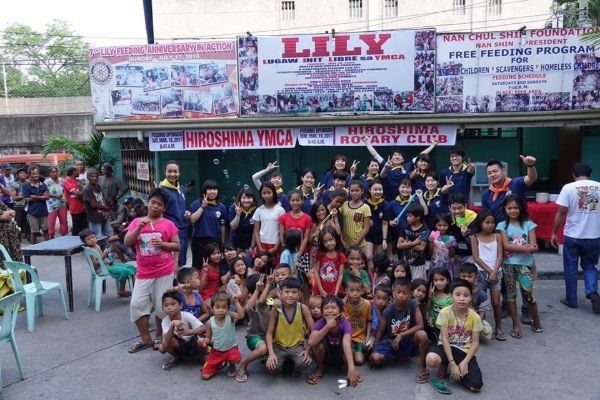
"Don't be afraid to get outside of the university". MS during her time volunteering with street children in Philippines.
(「怖がらずに大学の外へ出てみよう」ーフィリピンでストリート・チルドレンのためのボランティア活動の様子)
Finally, I asked MS "If you could give advice to yourself back when you first started university what advice would you give?"
(最後に、「もし大学入学時の自分自身にアドバイスをするとしたら?」という質問をしてみました。)
There are times when I wish I had studied more for the TOEIC test when I was a student. When you start working full time, even if you want to study, you may not have enough time to take the exam, or you may have to work on the exam date, which makes the exam itself difficult. HJU students are exempt from the examination fee if you get the target score, and a native teacher will hold TOEIC study sessions, so it is recommended that you study a lot during your school days and then you'll be able to get a good score.
(学生時代にもっとTOEIC の勉強をしておけばよかったと思う時があります。社会人になると勉強したくてもなかなかその時間が取れなかったり、仕事が受験日と被ったりと受験自体も難しくなります。女学院は基準のスコアを取ると受験料の免除があったり、ネイティヴの先生がTOEIC の勉強会を開いてくださるので、学生時代にたくさん勉強して良いスコアを取っておくことをオススメします。)
Well, thanks to MS. She is, as we can see from the many photos, busy nowadays, but she took the time to report back and to give you guys some good advice. On behalf of all readers, thank you MS!
(M.S.さん、忙しい日々を送っている中、学生の皆さんのために時間を割いてくださり本当にありがとうございました。)
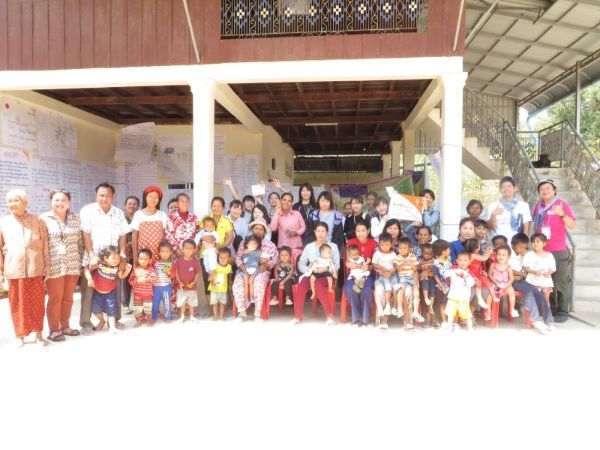
MS says her many chances to travel abroad, such as her time in Cambodia as part of the HJU work with World Vision, helped her to better understand the world.
(在学中、本学とWorld Visionによるカンボジアでのフィールドワークに参加するなど、さまざまな国を訪れ、世界への理解を深めました。)
